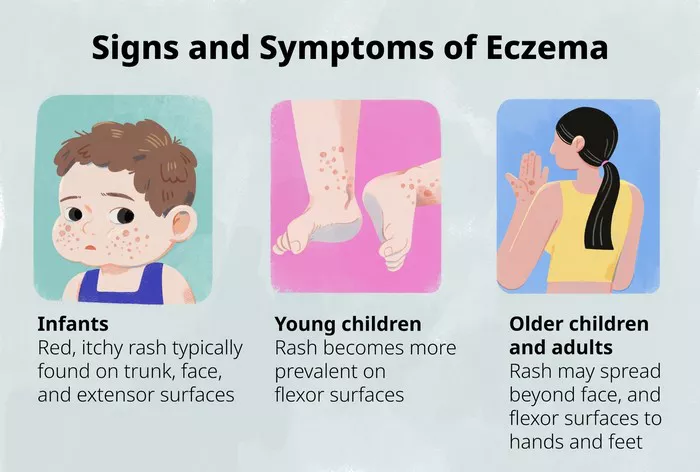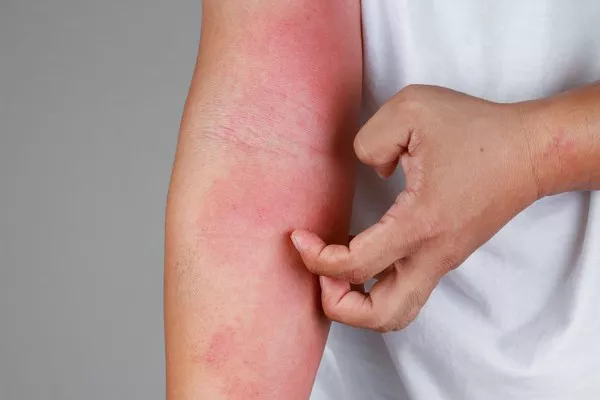Eczema, also known as atopic dermatitis, is a common skin condition that affects millions of people worldwide. It is characterized by inflammation, redness, and itching, often causing discomfort and distress to those who suffer from it. While eczema can manifest differently in individuals, there are five primary symptoms that commonly occur. Understanding these symptoms is crucial for accurate diagnosis, effective management, and improved quality of life for eczema patients.
1. Persistent Itching
One of the hallmark symptoms of eczema is persistent itching. This itching can range from mild to severe and is often described as intense or unbearable by those affected. The itchiness associated with eczema can occur anywhere on the body but is frequently concentrated in specific areas such as the hands, feet, elbows, knees, face, and neck.
The urge to scratch the affected areas can be overwhelming, leading to skin damage, inflammation, and even infection. Continuous scratching can further exacerbate eczema symptoms, creating a vicious cycle of itching and scratching known as the “itch-scratch” cycle. Managing itching is a primary focus of eczema treatment, as controlling this symptom can significantly improve the patient’s comfort and overall well-being.
2. Dry, Red, and Inflamed Skin
Another characteristic symptom of eczema is dry, red, and inflamed skin. Eczema flare-ups often result in patches of skin that appear red, swollen, and irritated. These areas may also feel warm to the touch and may develop a rough or scaly texture. The severity of skin dryness and inflammation can vary depending on the individual and the stage of the eczema flare-up.
The dryness associated with eczema is caused by a disruption in the skin’s natural barrier function, which allows moisture to escape more easily, leading to dry and cracked skin. Inflammation occurs as the body’s immune system reacts to triggers such as allergens or irritants, further exacerbating the redness and swelling. Proper skincare routines, including moisturizing and gentle cleansing, are essential for managing dry, inflamed skin in eczema patients.
3. Flare-Ups and Remissions
Eczema is characterized by periods of flare-ups and remissions, where symptoms worsen and improve, respectively. Flare-ups can be triggered by various factors, including stress, environmental allergens, irritants, changes in weather, and certain foods. During a flare-up, eczema symptoms intensify, causing increased itching, redness, inflammation, and discomfort.
Conversely, remission periods are characterized by a decrease in symptoms or the temporary absence of eczema flare-ups. These periods of relief provide much-needed respite for eczema patients and allow the skin to heal and recover. Understanding the triggers that can precipitate flare-ups and taking proactive measures to manage them can help minimize the frequency and severity of eczema symptoms.
4. Thickened or Cracked Skin
In some cases, chronic eczema can lead to the thickening or cracking of the skin, especially in areas that have been repeatedly scratched or irritated. This symptom, known as lichenification, occurs due to prolonged inflammation and trauma to the skin. Lichenified skin may appear leathery, rough, or scaly and is often accompanied by intense itching and discomfort.
The thickened skin associated with lichenification is more prone to cracking, which can further exacerbate eczema symptoms and increase the risk of infection. Proper skincare practices, including moisturizing and avoiding excessive scratching, are essential for preventing and managing lichenified skin in eczema patients. In severe cases, medical interventions such as topical steroids or immunomodulators may be necessary to reduce inflammation and promote skin healing.
5. Skin Discoloration and Hyperpigmentation
Over time, recurrent eczema flare-ups can lead to skin discoloration and hyperpigmentation in affected areas. This discoloration may manifest as darkening or lightening of the skin and is often more noticeable in individuals with darker skin tones. Hyperpigmentation occurs due to increased melanin production in response to inflammation and skin damage caused by eczema.
Skin discoloration and hyperpigmentation can persist even after the eczema flare-up has resolved, affecting the patient’s self-esteem and quality of life. Sun protection, gentle exfoliation, and topical treatments containing ingredients such as hydroquinone or retinoids may help reduce the appearance of hyperpigmentation and promote more even skin tone.
Conclusion
In conclusion, eczema is a complex skin condition characterized by various symptoms that can significantly impact the quality of life of affected individuals. By understanding the five key symptoms of eczema—persistent itching, dry, red, and inflamed skin, flare-ups and remissions, thickened or cracked skin, and skin discoloration and hyperpigmentation—patients and healthcare professionals can work together to develop personalized treatment plans aimed at managing symptoms, preventing flare-ups, and improving overall skin health and well-being.
























